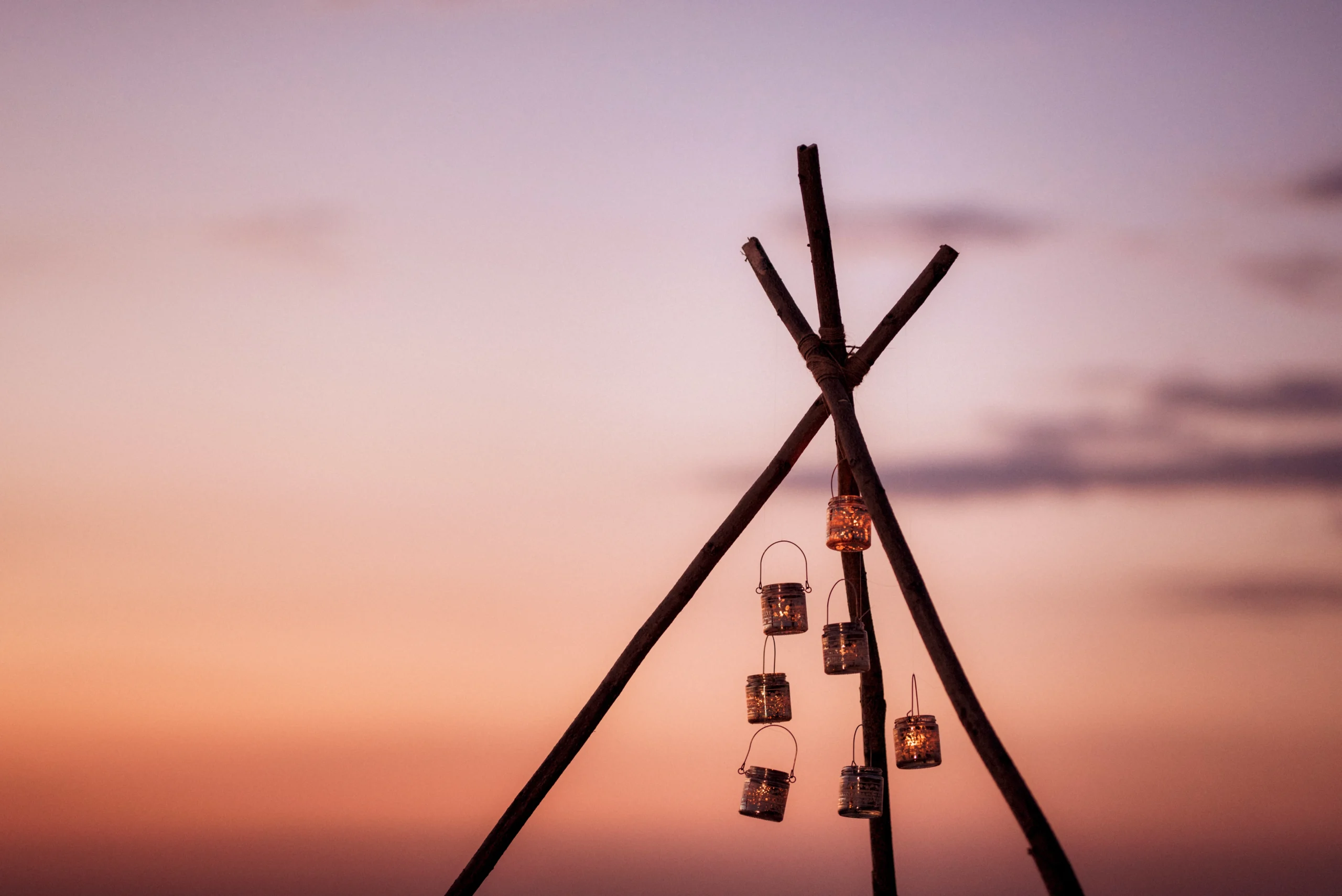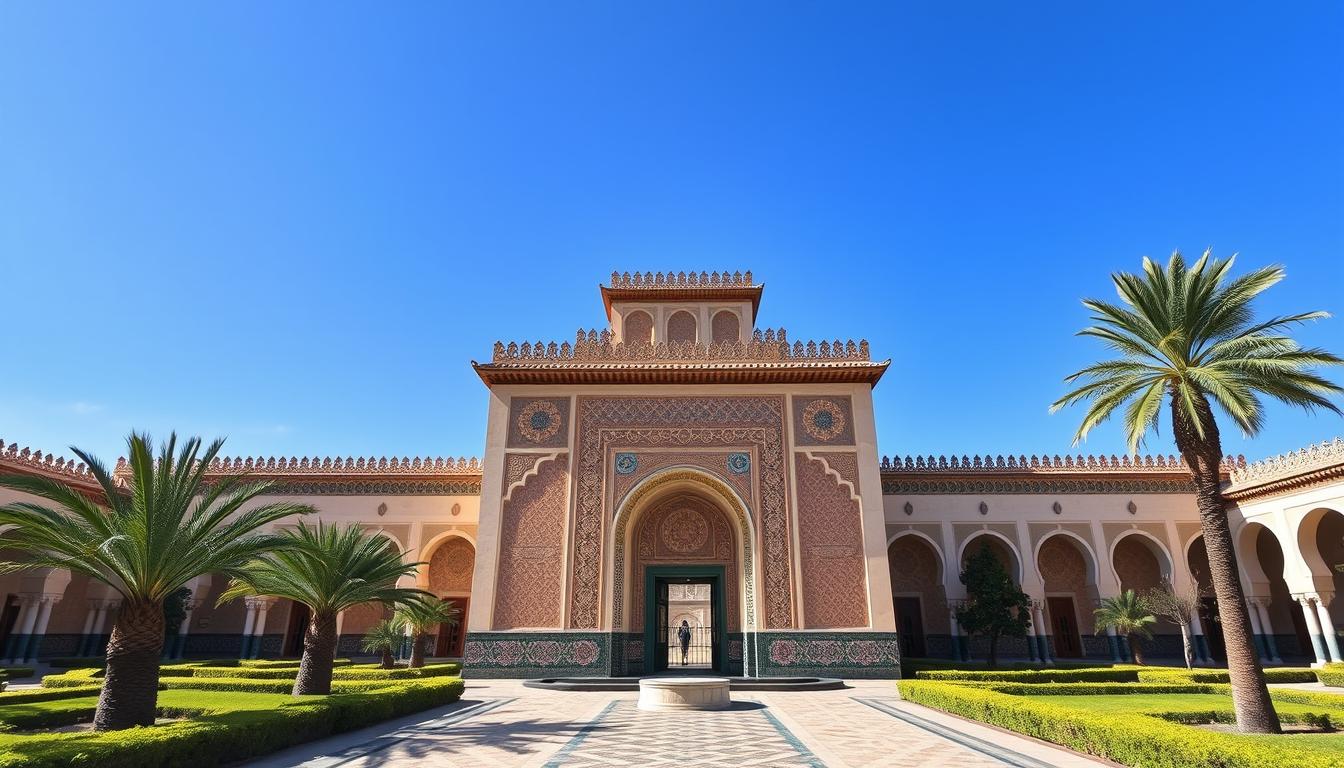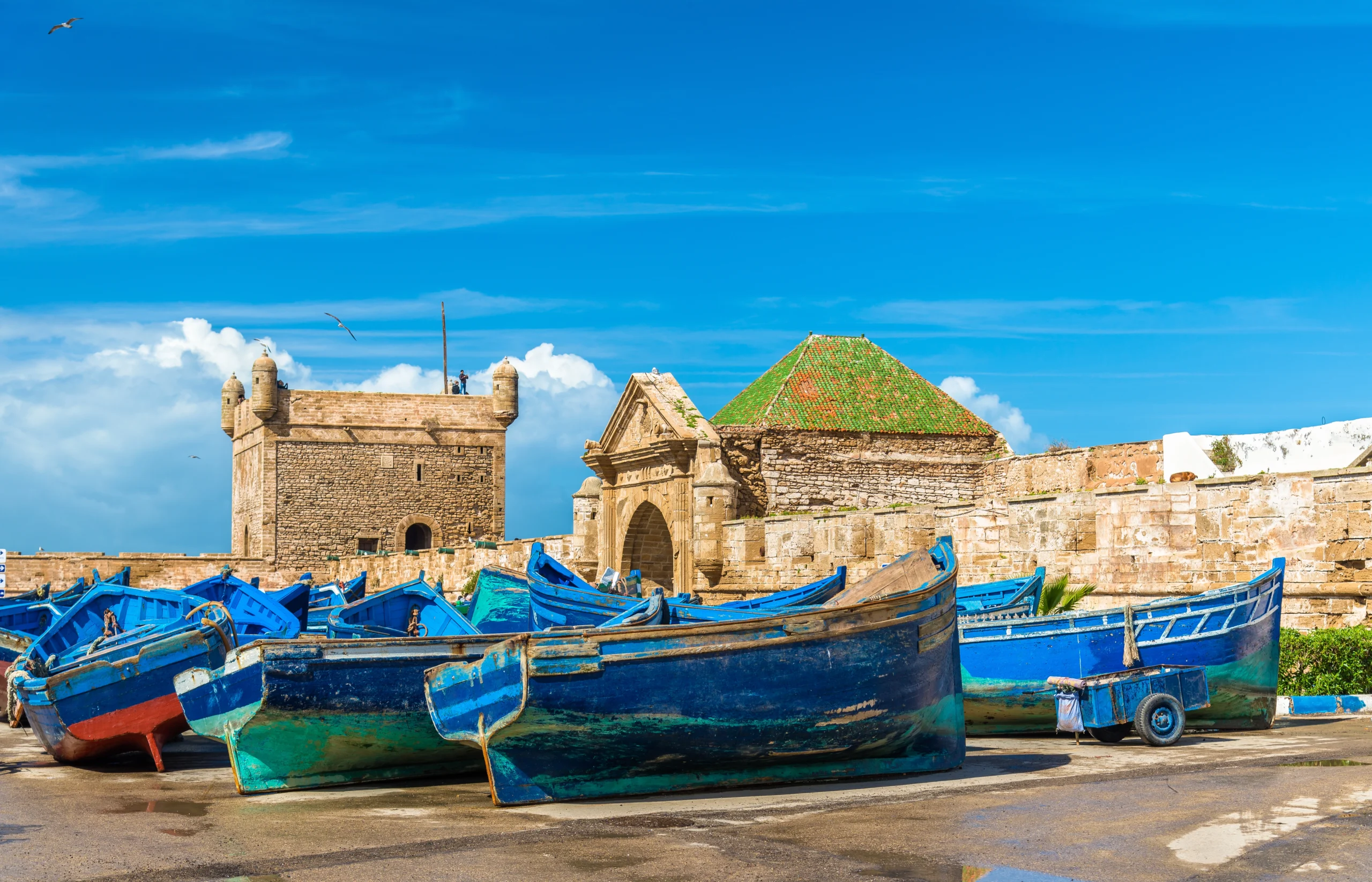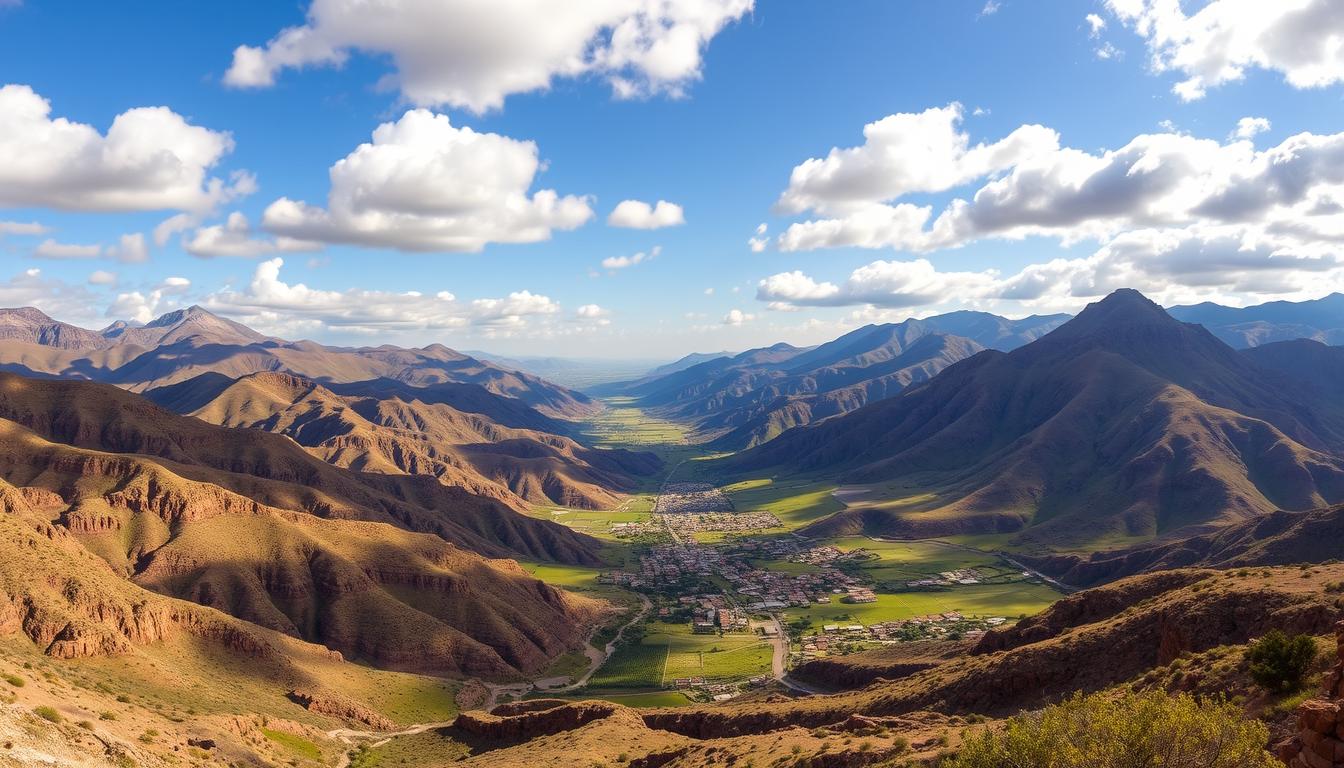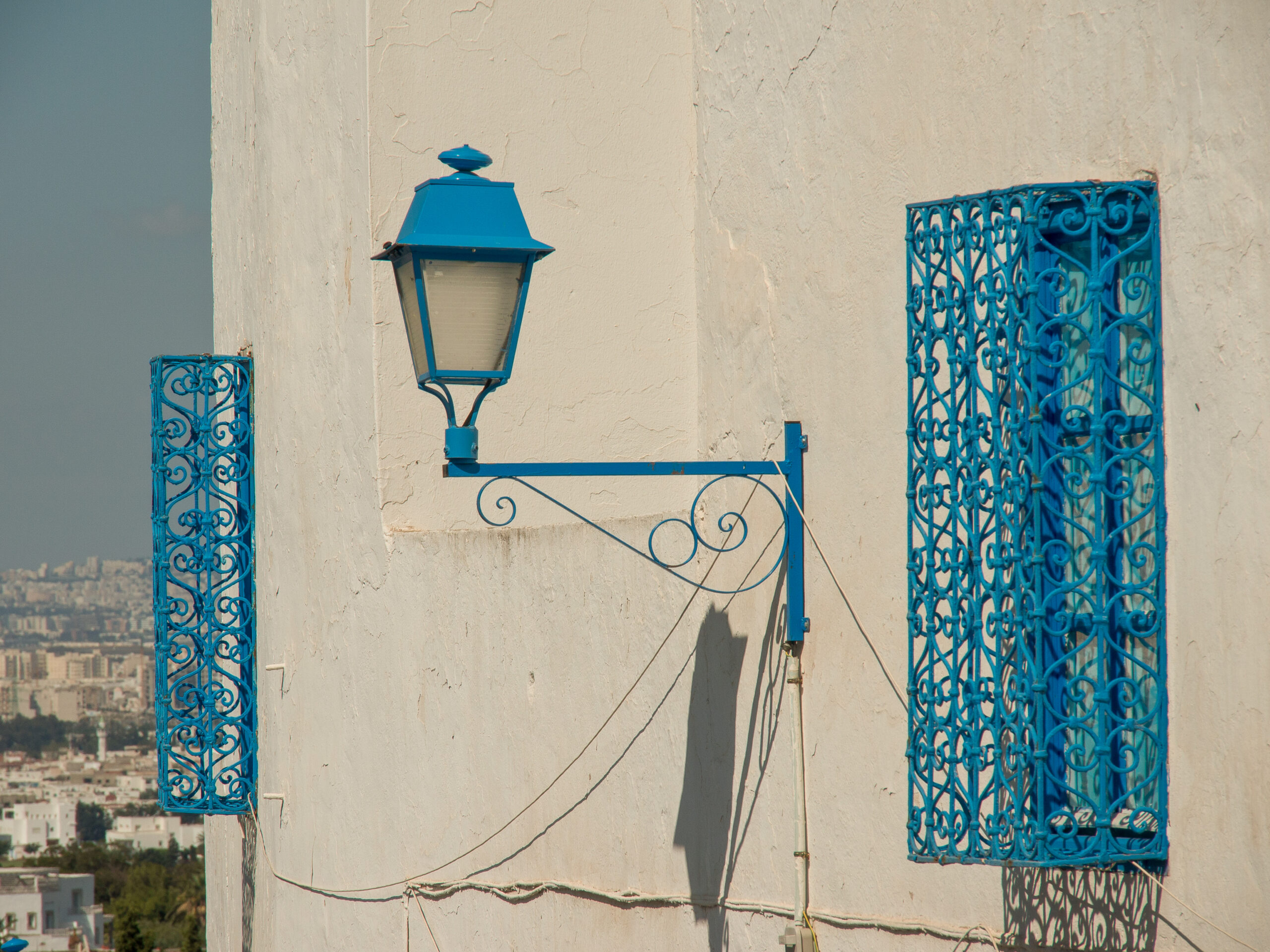Imagine being in a Moroccan marketplace, surrounded by vibrant colors. The air is filled with exotic spices and the sound of distant prayer. Your trip to Morocco will be an amazing adventure that changes how you see travel.
This morocco travel guide invites you to see a land where old traditions meet modern life. It’s a place where ancient stories and new experiences blend together.
Traveling through Morocco is like experiencing a world of colors and sounds. You’ll see the lively streets of Marrakech and the calm Sahara Desert. Every place you visit offers a new story to tell.
For food lovers, Travelling Through Morocco means indulging in tagines, couscous, and mint tea. If you love culture, the architecture and traditions you’ll encounter while Travelling Through Morocco will leave you in awe.
Travelling Through Morocco is a journey into a land of rich culture, vibrant landscapes, and warm hospitality. Travelling Through Morocco lets you explore old medinas, savor amazing food, and meet locals who will make your trip unforgettable. Whether you’re trekking through the Atlas Mountains or enjoying a sunset in the Sahara Desert, Travelling Through Morocco offers endless adventure.
Key Takeaways
- Morocco offers diverse experiences from desert to mountain landscapes
- Rich cultural heritage provides unique travel opportunities
- Travelers can explore both traditional and modern aspects of Moroccan life
- Moroccan cuisine and hospitality are world-renowned
- Multiple cities offer distinct and memorable experiences
An Introduction to Morocco: A Traveler’s Paradise
Start your moroccan adventure and get ready to be amazed. Morocco is a place where old traditions meet modern life. It invites you to see its beautiful landscapes and rich culture.
Learning about Morocco’s geography is the first step in your cultural journey. You’ll see everything from the Atlas Mountains to the Sahara Desert. Each place is breathtaking in its own way.
Geographic Overview – Travelling Through Morocco
Morocco’s geography is truly unique. It has:
- Mountainous terrain of the Atlas Range
- Expansive Sahara Desert in the southeast
- Mediterranean coastline in the north
- Atlantic Ocean shoreline to the west
Cultural Highlights – Travelling Through Morocco
Morocco’s culture is as varied as its landscapes. You’ll find influences from Berber, Arab, and French cultures. This mix creates a vibrant tapestry of traditions and customs.
*”Morocco is not just a destination, it’s an experience that transforms your perspective.”*
| Cultural Element | Significance |
|---|---|
| Languages | Arabic, Berber, French |
| Religious Influence | Islamic traditions |
| Architectural Style | Moorish and Mediterranean blend |
Your moroccan adventure is waiting. It promises a journey filled with beauty, traditions, and warm welcomes.
Preparing for Your Journey to Morocco
Planning your trip to Morocco needs careful thought and knowing what to bring. A good morocco travel guide helps you understand what you need for a great trip. Start by getting your documents and taking the right precautions for a smooth and fun journey.
Essential Travel Documents – Travelling Through Morocco
Before you go, make sure you have these important documents:
- Valid passport (must be valid for at least 6 months beyond your planned stay)
- Tourist visa (for most US travelers, a visa is not required for stays up to 90 days)
- Copies of important documents stored separately
- International driving permit (if planning to rent a vehicle)
“Preparation is the key to a successful travel experience in Morocco.” – Experienced Travelers
Health and Safety Precautions
Keeping yourself healthy is key when traveling through Morocco. Here are some tips to follow to ensure a safe and enjoyable journey:
- Consult your healthcare provider about recommended vaccinations
- Purchase travel insurance that covers you fully
- Bring a basic medical kit with your essential medicines
- Drink plenty of water and be careful with street food
Being aware of local health issues and risks is important. Carry your medicines, know where to find healthcare, and follow basic safety tips. This way, you can have a safe and fun trip.
Pro Tip: Register with the US State Department’s STEP program for extra travel support and emergency alerts.
Exploring Morocco’s Vibrant Cities
Traveling through Morocco is a journey into North Africa’s most exciting cities. Each city has its own story, mixing old traditions with new life. You’ll see a mix of culture, history, and amazing buildings.
Morocco’s cities are more than places to visit; they are living museums. They show history and new ideas. You’ll find busy markets and amazing buildings that make your trip unforgettable.
Marrakech: The Jewel of the South
Marrakech is known for its lively vibe and old-world charm. The famous Djemaa el-Fna square comes alive at night. It’s filled with:
- Street performers and musicians
- Traditional food vendors
- Intricate handicraft displays
“Marrakech is a dream that keeps the senses alert and the heart racing.” – Travel Enthuasiast
Fes: The Intellectual Heart
Fes is Morocco’s cultural center, with an ancient medina that feels like stepping back in time. It’s known for its universities and traditional crafts. It’s a key part of Morocco’s learning and culture.
Casablanca: A Modern Metropolis
Casablanca shows Morocco’s modern side, with its modern buildings and city life. The city has:
- Stunning modern buildings
- Thriving business districts
- Sophisticated cultural venues
When you travel through Morocco, these cities offer different experiences. They will give you memories that last a lifetime of your North African trip.
The Enchanting Sahara Desert Experience
Start an unforgettable journey in the Sahara Desert. It will change how you see natural beauty. This desert is a stunning setting for your Moroccan adventure, taking you on an amazing journey through one of the world’s most beautiful landscapes.
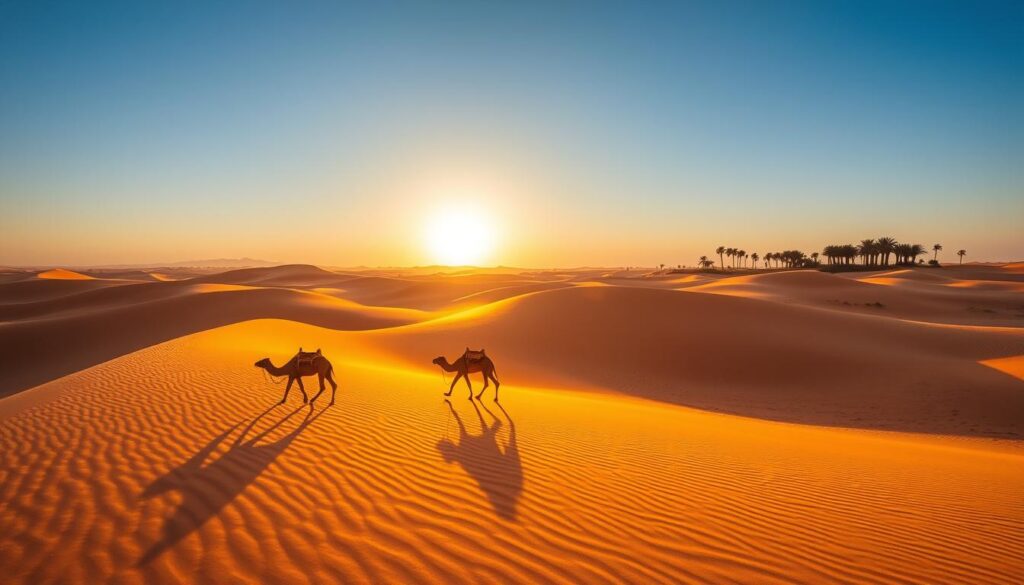
The Sahara is more than a place—it’s a deep experience. It connects you with the raw, untouched wilderness. Your Moroccan adventure peaks when you explore this incredible desert ecosystem.
Best Ways to Experience the Sahara
- Overnight desert camping under starlit skies
- Sunrise and sunset photography tours
- Sandboarding on massive golden dunes
- Traditional Berber camp experiences
Camel Trekking Adventures – Travelling Through Morocco
Camel trekking in Morocco is a highlight of your desert experience. These guided tours let you explore the vast sand landscapes. You’ll feel a deep connection with the desert’s rhythm.
“The Sahara is not just a place, it’s a feeling that transforms your soul.” – Moroccan Desert Guide
When planning your camel trek, keep these tips in mind:
- Choose morning or late afternoon tours to avoid extreme heat
- Wear comfortable, loose-fitting clothing
- Bring sufficient water and sun protection
- Pack a light jacket for cool desert nights
Whether you’re looking for adventure or peace, the Sahara offers a memorable Moroccan experience. Get ready to be amazed by its timeless beauty and deep silence.
Traveling through Morocco’s Scenic Landscapes
Start an unforgettable journey through Morocco’s stunning landscapes. Morocco is a treasure trove of natural wonders. You’ll see rugged mountains, beautiful coastal cities, and dramatic waterfalls. It’s an adventure you won’t forget.
The Atlas Mountains: A Majestic Wilderness
The Atlas Mountains are a must-see on your Moroccan adventure. These mountains cover Morocco, perfect for hiking and learning about local cultures. You’ll find:
- Breathtaking mountain trails
- Traditional Berber villages
- Stunning panoramic views
- Unique wildlife and vegetation
Coastal Gems: Agadir and Essaouira
Don’t miss the coastal cities of Agadir and Essaouira on your road trip. These places offer sun, culture, and relaxation.
| City | Highlights | Best For |
|---|---|---|
| Agadir | Modern beaches, water sports | Relaxation and adventure |
| Essaouira | Historic medina, wind surfing | Cultural exploration |
The Stunning Ouzoud Waterfalls
Visit the Ouzoud Waterfalls to see Morocco’s beauty. These falls drop 110 meters down rocky cliffs, a natural wonder.
“The Ouzoud Waterfalls are a hidden gem that showcases the raw beauty of Morocco’s natural landscapes.” – Moroccan Travel Guide
Planning your Moroccan road trip? These landscapes have something for everyone. Adventure, culture, or nature, Morocco’s scenic routes will amaze you. They’ll leave you with memories that last forever.
Sampling Moroccan Cuisine: A Culinary Journey
Start a delicious moroccan culinary tour that will excite your taste buds. It will also let you dive into Morocco’s rich flavors. Food is at the heart of Moroccan culture. It’s a special way to experience the country’s lively heritage through every bite.
Your journey into Moroccan culture starts with traditional dishes. These dishes have been perfected over generations. The mix of Berber, Arabic, and Mediterranean flavors creates a unique culinary world.
Traditional Dishes to Savor – Travelling Through Morocco
- Tagine: A slow-cooked stew named after the clay pot it’s prepared in
- Couscous: The national dish, typically served with vegetables and meat
- Pastilla: A unique sweet and savory pie filled with pigeon or chicken
- Harira: A hearty soup traditionally eaten during Ramadan
Sweet Endings: Unique Desserts and Teas
No moroccan culinary tour is complete without trying the country’s famous sweets and drinks. Moroccan mint tea, known as “Berber whiskey,” is more than a drink. It’s a sign of hospitality.
“In Morocco, tea is not just a drink, it’s a ceremony of friendship and respect.”
- Chebakia: A honey-soaked sesame cookie
- Kaab el Ghzal: Gazelle horn pastries filled with almond paste
- M’hanncha: The “snake cake” with an almond filling
Your culinary adventure will change how you see Moroccan cuisine. It shows how food connects us to deeper cultural ties.
The Rich Cultural Heritage of Morocco
Morocco invites travelers to explore a world of cultural wonders. These wonders span centuries of artistic and architectural brilliance. Your journey through Moroccan culture promises to be extraordinary.
The cultural landscape of Morocco is a stunning mix of Berber, Arab, and European influences. Each city has its own story. This makes Moroccan cities highlights an incredible experience for curious travelers.
Architectural Wonders That Take Your Breath Away
Morocco’s architectural treasures show its rich history. You’ll see breathtaking structures with detailed design and cultural significance:
- Hassan II Mosque in Casablanca – A stunning example of Islamic architecture
- Blue City of Chefchaouen – Known for its stunning azure-painted buildings
- Traditional riads with ornate courtyards and detailed tile work
“Architecture is a visual narrative of a civilization’s soul.” – Moroccan Design Historian
Festivals and Events That Celebrate Tradition
Immerse yourself in Morocco’s vibrant cultural celebrations. These celebrations offer deep insights into local life. Key festivals include:
- Ramadan – A spiritual month of reflection and community
- Eid al-Fitr – A joyous celebration marking the end of Ramadan
- Fes Festival of World Sacred Music – An internationally renowned cultural event
Exploring these cultural dimensions will make your trip unforgettable. Learn more about planning your Moroccan adventure at comprehensive travel guides. They can help you navigate this fascinating destination.
Navigating Local Transportation in Morocco
Traveling through Morocco can be amazing if you know how to get around. You need to plan well and understand the local transport systems.
A road trip in Morocco gives you many ways to see the country. Your choice of transport affects your journey, comfort, and how much you spend.
Public Transport Options
Morocco has a great public transport network. It helps you move around the country easily:
- Trains: Modern and comfy, linking big cities
- Buses: Cheap and far-reaching, reaching many towns
- Shared Taxis (Grand Taxis): Fast for short trips
“Transportation in Morocco is an adventure in itself!” – Moroccan Travel Guide
Rental Cars vs. Taxis
Deciding between renting a car or taking taxis depends on your travel style. Here’s a quick look:
| Rental Cars | Taxis |
|---|---|
| Complete travel flexibility | No parking worries |
| Explore off-the-beaten-path areas | Lower upfront costs |
| More personal freedom | Local driver’s insight |
To enjoy your Morocco road trip, mix different transport options. This way, you get the most out of your trip and avoid stress.
Tips for Engaging with Moroccan Locals
Diving into Moroccan culture is more than just visiting tourist spots. Your guide to connecting with locals goes beyond sightseeing. It focuses on meaningful cultural interactions that change your travel experience.
Successful cultural connections start with understanding and respect. Moroccan people value travelers who truly try to grasp their rich cultural traditions.
Learning Basic Arabic and Berber Phrases
Learning a few key phrases can open doors to real interactions. Here are essential words to help you connect:
- Salam Alaikum – Hello (Arabic greeting)
- Shukran – Thank you
- Afak – Please
- Labess? – How are you? (Berber phrase)
Respecting Local Customs and Etiquette
| Cultural Norm | Recommended Behavior |
|---|---|
| Dress Code | Modest clothing covering shoulders and knees |
| Greetings | Handshakes with right hand, gentle and respectful |
| Religious Sites | Ask permission before photographing, dress conservatively |
“Respect is the passport to genuine cultural understanding.” – Moroccan Proverb
Your guide to Moroccan culture is about showing genuine interest. Locals appreciate travelers who approach their culture with humility and curiosity.
Shopping in Morocco: Markets and Souks
Explore the lively world of Moroccan shopping. Every market has its own story and every buy is part of your adventure. The souks of Morocco offer a unique experience, more than just shopping.
Moroccan cities are known for their amazing markets. Here, traditional crafts meet modern shopping. These markets are full of colors, sounds, and amazing products made by artisans.
Bargaining Tips for Travelers
Learning to bargain is key in Moroccan markets. Here are some tips:
- Start by asking for 40-50% off the first price
- Stay friendly and polite while negotiating
- Be ready to leave if the price is too high
- Try to learn some Arabic or Berber phrases
Unique Souvenirs to Bring Home
Don’t leave without some special souvenirs. Here are some authentic finds:
| Souvenir Type | Price Range | Best Location |
|---|---|---|
| Handwoven Rugs | $100-$500 | Marrakech Souks |
| Ceramic Tagines | $20-$80 | Fez Markets |
| Argan Oil | $10-$30 | Essaouira |
| Silver Jewelry | $50-$200 | Casablanca |
“Shopping in Morocco is not just about buying items, it’s about experiencing a rich cultural exchange.” – Moroccan Travel Guide
Make sure to have extra space in your luggage and carry cash. Each souvenir is a piece of your memorable journey through Moroccan cities.
Outdoor Activities: Adventure Awaits
Your Moroccan adventure is more than just seeing sights. Morocco has amazing outdoor activities for you to explore. You can hike mountains or go on coastal adventures. These experiences will give you memories you’ll always treasure.
Hiking and Trekking Opportunities
Morocco’s terrain is perfect for hiking, no matter your skill level. The Atlas Mountains offer trails with stunning views. You can choose from long treks or shorter, scenic walks.
- High Atlas Mountain Trails
- Rif Mountain Routes
- Toubkal National Park Treks
Water Sports Along the Coast
Coastal areas are great for water sports. You can surf, windsurf, or kitesurf. These activities show off Morocco’s beautiful coastlines.
| Location | Water Sport | Difficulty Level |
|---|---|---|
| Taghazout | Surfing | Beginner to Advanced |
| Essaouira | Windsurfing | Intermediate |
| Dakhla | Kitesurfing | Advanced |
“The beauty of Morocco lies not just in its cities, but in its wild, untamed landscapes waiting to be explored.” – Adventure Travel Magazine
Whether you’re climbing mountains or surfing the sea, Morocco offers incredible outdoor adventures. These experiences will connect you with the country’s natural beauty in a special way.
Safety Tips for Travelling Through Morocco
When you start your morocco travel guide adventure, safety is key. Morocco offers amazing experiences, but being ready helps you face challenges and enjoy your trip without worries.
Morocco is full of unique travel moments that need you to think about safety and health. Knowing the right steps can make your trip unforgettable and stress-free.
Protecting Your Valuables
Keeping your stuff safe is important in Morocco’s busy cities. Here are some tips:
- Use a money belt or hidden pouch for important documents
- Avoid showing off expensive jewelry or electronics
- Keep your wallet in front pockets in crowded places
- Use hotel safes for passports and extra cash
Health Considerations for Travelers
Staying healthy on your morocco travel guide adventure means planning ahead:
| Health Aspect | Recommended Actions |
|---|---|
| Water Safety | Drink bottled water, avoid tap water |
| Food Precautions | Eat at trusted restaurants, avoid street food at first |
| Sun Protection | Use high SPF sunscreen, wear light clothes |
“Preparation is the key to a safe and enjoyable travel experience in Morocco.” – Experienced Traveler
By following these safety tips, you’ll be ready to enjoy Morocco’s beautiful landscapes, rich culture, and friendly people. You’ll travel with confidence and peace of mind.
The Best Times to Visit Morocco
Planning your trip to Morocco needs careful thought. You must consider the country’s climate and cultural events. A good travel guide will help you find the best time for an amazing journey.
Knowing Morocco’s seasons can make your trip better. The country has something special all year round. This makes it great for travelers with different tastes.
Seasonal Weather Patterns
Morocco’s weather changes a lot depending on where you are. Here’s a quick guide to help you plan:
- Coastal Regions: Mild winters and warm summers
- Atlas Mountains: Cool temperatures with snow in winter
- Sahara Desert: Very hot in summer, cool in winter
Festivals and Events by Month
Visiting Morocco during festivals can make your trip even better:
- April: Essaouira Gnawa Music Festival
- July: Fes Festival of World Sacred Music
- September: Imilchil Marriage Festival
- November: Marrakech International Film Festival
“Travel is the only thing you buy that makes you richer” – Anonymous
Spring (March to May) and autumn (September to November) are the best times to visit. The weather is perfect for exploring Morocco’s landscapes and cities.
Conclusion: Embrace the Moroccan Adventure
Your trip to Morocco will be unforgettable. It combines rich culture, beautiful landscapes, and lively cities. You’ll see everything from Marrakech’s markets to the Sahara Desert’s calm.
Traveling in Morocco is more than a trip. It’s a journey where old traditions meet new life. You’ll see amazing places like Fes, Essaouira, and the Atlas Mountains. Each spot offers a unique view of Morocco’s culture.
Recap of Must-See Destinations
Don’t miss Chefchaouen’s blue streets, Marrakech and Fes, and Merzouga’s desert. Try local food, visit markets, and talk to the friendly people. These moments will stay with you forever.
Encouragement to Explore Further
When planning your Moroccan trip, remember there’s always more to find. Morocco is full of stories. Whether you love history, food, or nature, Travelling Through Morocco will be filled with discovery and connection.
FAQ
Do I need a visa to travel to Morocco?
Most U.S. travelers can enter Morocco without a visa for 90 days. You’ll need a valid passport with six months of validity left. Always check the latest visa rules with the Moroccan embassy before you go.
What is the best time of year to visit Morocco?
Spring (March to May) and fall (September to November) are the best times to visit. The weather is mild and perfect for exploring and outdoor activities.
Is Morocco safe for tourists?
Morocco is safe for tourists. But, always be careful. Know your surroundings, keep your belongings safe, and respect local customs. Avoid walking alone at night and use safe transport.
What currency is used in Morocco?
The Moroccan Dirham (MAD) is the official currency. Credit cards work in big cities and tourist spots. But, carry cash for small buys, like in markets and rural areas. You can exchange money at banks, airports, and some hotels.
What language is spoken in Morocco?
Arabic is the official language, with Berber and French also spoken. Many people in tourist areas speak some English. Learning Arabic or French phrases is helpful and appreciated.
What should I wear in Morocco?
Morocco is conservative, so dress modestly. Women should cover shoulders and knees. Men should avoid short shorts. Dress can be more relaxed in cities, but be more conservative in rural and religious areas.
How do I get around Morocco?
Morocco has trains, buses, and grand taxis for travel. Renting a car is possible but challenging. In cities, use petit taxis for local trips.
What vaccinations do I need for Morocco?
Talk to your doctor before traveling. You’ll likely need Hepatitis A, Typhoid, and Tetanus shots. Some might also need Hepatitis B and Rabies vaccines. Travel insurance with medical coverage is a good idea.
Is tap water safe to drink in Morocco?
Stick to bottled water and avoid tap water. Be careful with ice, uncooked foods, and street drinks. Hotels and restaurants often use filtered water, but it’s safer to be cautious.
What are some must-try Moroccan foods?
Try tagine, couscous, pastilla, and Moroccan mint tea. Don’t miss merguez sausages and harira soup. Each region has its own specialties, so explore different foods.

